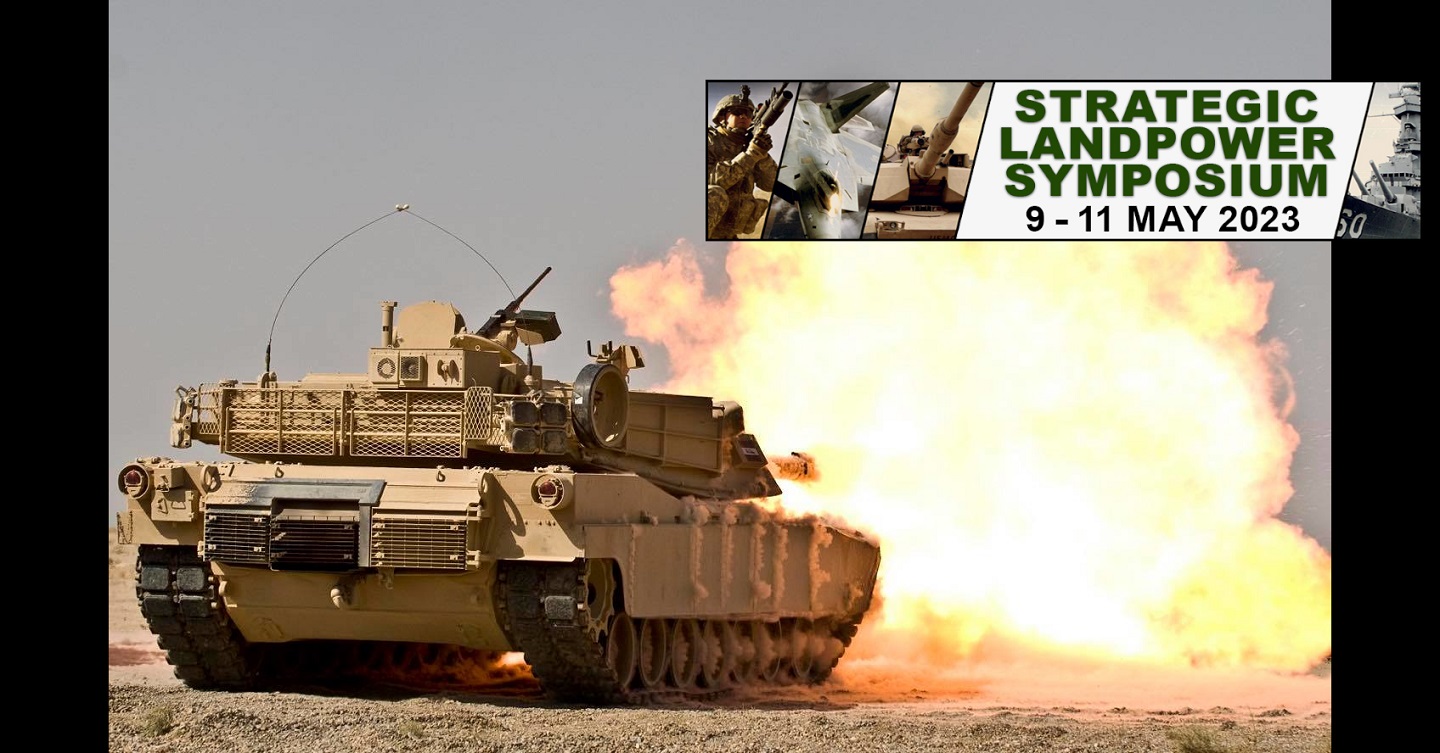
From 10-12 May 2022 the War College hosted the first annual Strategic Landpower Symposium. Bringing together students, scholars and practitioners the symposium displayed original research and presented solutions to senior leaders about how landpower can help achieve national objectives in the future. As part of symposium Army leadership asked the United States Army War College Strategic Landpower Integrated Research Project faculty to address the future role of strategic landpower. Taking up that challenge seven members of the USAWC class of 2022 participated in the integrated research project as part of their Masters in Strategic Studies degree research requirement and presented their results at the symposium to amplify their work. A BETTER PEACE has organized two podcast sessions with those students to discuss their projects, their relationship to the strategic landpower symposium and possible implications for the future of U.S. security policy. In the virtual studio for this first episode to discuss shaping the theater are Phil Baker, Gregory Foxx, Kirk Sanders and Carl Zeppengno. They join podcast editor Ron Granieri to discuss a variety of aspects pertaining to landpower to include, the National Guard State Partnership Program, special operations persistent forward presence, theater ISR operations and Marine Advance Based Operations alongside Army landpower doctrine.
The second annual Strategic Landpower Symposium is set for 9-11 May 2023 and there is a call for papers due by 15 January 2023. Registration can be accomplished online. The theme will be the “Role of Strategic Landpower in Future Joint and Combined Operations.”
…seen by your partners so the they know that you’re engaged and seen by your adversaries so they know that you are really there…this is why it’s so important to actually be on the ground because that’s how people see you…
Podcast: Download
Phil Baker is a Lieutenant Colonel and Army Engineer with the North Dakota Army National Guard with 34 years of combined service. Prior to the War College, Baker was Battalion Commander of the 164 Engineer Battalion. His next assignment is Garrison commander at the Camp Grafton Training Center in North Dakota. He is a graduate of the AY22 Resident Course at the U.S. Army War College.
Greg Foxx is a Colonel and a Psychological Operations (PSYOP) officer with extensive experience in key PSYOP positions including Detachment Commander, Company Commander, Battalion Executive Officer and Commander, and Group Operations Officer, Executive Officer, and Deputy Commander. His operational assignments include peacekeeping operations in Kosovo, support to Special Operations Command Pacific, and multiple combat deployments to Iraq and Afghanistan. He is assigned to U.S. Army Special Operations Command following War College. He is a graduate of the AY22 Resident Course at the U.S. Army War College.
Kirk A Sanders is a GG-15 Defense Intelligence Agency civilian and a retired Army Lieutenant Colonel. He received a Master’s in Strategic Intelligence from the Joint Military Intelligence College and is a fellow from the Harvard University Kennedy School of Government (HKS) as a Senior Executive Fellow. He had a 24-year career in the Army and prior to his arrival at Carlisle Barracks, he served at the U.S. Indo-Pacific Command as the Deputy Chief J2C, ISR Operations Division. He is a graduate of the AY22 Resident Course at the U.S. Army War College.
Carl Zeppegno is a Lieutenant Colonel and an intelligence officer in the United States Marine Corps. Throughout his career he has deployed five time to Afghanistan with infantry units, as a targeting officer, an intelligence officer, and working with strategic intelligence. He spent the last 10 years working with defense and strategic human intelligence and was assigned to the U.S. Embassy in Nairobi, Kenya from 2012 – 2015. Following War College he has assumed the duties as the senior Marine at the Defense Intelligence Agency. He is a graduate of the AY22 Resident Course at the U.S. Army War College.
Ron Granieri is an Associate Professor of History at the U.S. Army War College and the Editor of A BETTER PEACE.
The views expressed in this presentation are those of the speakers and do not necessarily reflect those of the U.S. Army War College, U.S. Army, or Department of Defense.
Photo Credit: Photo by Elena Patton, U.S. Army War College Public Affairs





If the opponents of the U.S./the West (includes but is not limited to such nations as China and Russia) can be seen to be working hard to “contain” — and/or to “roll back” — U.S./Western power, influence and control throughout the world today,
U.S./Western power, influence and control that has been placed in jeopardy by way of the U.S./the West’s efforts to achieve “revolutionary” political, economic, social and/or value “change” both here at home and there abroad post-the Old Cold War (in the name of such things as capitalism, globalization and the global economy),
(Allows one’s opponents to work “by, with and through” those individuals and groups, and those states and societies, who believe that they will not profit — and indeed who believe that they will lose — via these such “revolutionary changes.”)
Then what part must — and/or indeed can — “strategic landpower” play; this, in preventing these such opponents from (a) achieving their “containment and roll back of U.S./Western power, influence and control” political objectives; this, (b) largely “by, with and through” those disaffected individuals and groups — and those disaffected states and societies — who believe that they already have — or who believe that they soon will — (1) lose power, influence and control (2) via the U.S./the West’s “revolutionary” political, economic, social and/or value “change” initiatives?
Possibly stated more succinctly: What is the role of “landpower” in (a) achieving “revolutionary change” objectives both at home and abroad; this, (b) in the face of active resistance to such changes both at home and abroad?
I will get “shaping the theater” at my conclusion below. But first let us look at the suggestions presented by LTG (ret.) Cleveland and GEN (ret.) Votel (et. al) which, I suggest, might answer my question above: “What is the role of ‘landpower’ in (a) achieving ‘revolutionary change’ objectives both here at home and there abroad; this, (b) in the face of active resistance to such changes both here at home and there abroad?”:
LTG (ret.) Cleveland:
“The Achilles’ heel of our authoritarian adversaries is their inherent fear of their own people; the United States must capitalize on this fear. … An American way of irregular war will reflect who we are as a people, our diversity, our moral code, our undying belief in freedom and liberty. It must be both defensive and offensive. Developing it will take time, require support from the American people through their Congress, and is guaranteed to disrupt the status quo and draw criticism. It will take leadership, dedication, and courage. It is my hope that this study encourages, informs, and animates those with responsibility to protect the nation to act. Our adversaries have moved to dominate in the space below the threshold of war. It will be a strategy built around an American way of irregular war that defeats them.”
(See the Rand paper “The American Way of Irregular War: An Analytical Memoir; therein, see the “Conclusion” of the “Summary” Chapter, at Page xxiii.)
GEN Votel (et. al):
“Advocates of UW first recognize that, among a population of self-determination seekers, human interest in liberty trumps loyalty to a self-serving dictatorship, that those who aspire to freedom can succeed in deposing corrupt or authoritarian rulers, and that unfortunate population groups can and often do seek alternatives to a life of fear, oppression, and injustice. Second, advocates believe that there is a valid role for the U.S. Government in encouraging and empowering these freedom seekers when doing so helps to secure U.S. national security interests.”
(See the National Defense University Press paper “Unconventional Warfare in the Gray Zone” by authors Joseph L. Votel, Charles T. Cleveland, Charles T. Connett, and Will Irwin; therein, see the major section entitled “Doctrine.”)
Thus, from the perspective offered above, might we say that LTG (ret.) Cleveland and GEN (ret.) Votel (et. al) suggest (if I have read them right) that:
a. If our both great power and small opponents, our both state and non-state actor opponents and our both here at home and there abroad opponents intend to (a) “contain” and “roll back” the power, influence and control of the U.S./the West; this, by (b) working more “by, with and through” those individuals and groups — and those states and societies — who would LOSE/who have LOST power, influence and control via the U.S./the West’s “revolutionary” political, economic, social and/or value “change” initiatives,
b. Then, to counter these such efforts, LTG (ret.) Cleveland and GEN (ret.) Votel (et. al) suggest that the U.S./the West fight back by working to (a) “contain” and “roll back” the power, influence and control of our various and diverse opponents (see my list at “a” above); this, by (b) working more “by, with and through” those individuals and groups — and those states and societies — who would GAIN power, influence and control via the U.S./the West’s such “revolutionary” political, economic, social and/or value “change” initiatives.
(A shorter version of the above might look something like this?:
If our opponents are going to move out smartly to work more “by, with and through” the natural ENEMIES of “revolutionary change,” to wit: the more conservative/the more no-change elements of the populations and the states and societies of the world, then the U.S./the West must move out just as smartly; in our case, to work more “by, with and through” the natural ALLIES of “revolutionary change,” to wit: the more liberal/the more-pro-change elements of the populations and the states and societies of the world.)
Bottom Line Thought — Based on the Above:
“Shaping the theater” — thus from the perspective offered by LTG (ret.) Cleveland and GEN (ret.) Votel (et. al) above (again, if I have read them right) — this means working largely (a) with the pro-change liberal populations and governments and (b) against the anti-change conservative populations and governments? This such logic being presented in our very own Joint Publication 3-22, Foreign Internal Defense, below?:
“a. An IDAD (Internal Defense and Development) Program integrates security force and civilian actions into a coherent, comprehensive effort. Security force actions provide a level of internal security that permits and supports growth through balanced development. This development requires (dare we say “revolutionary”) change to meet the needs of vulnerable groups of people. This change may, in turn, promote unrest in the society (from those who would lose power, influence and control via these such “revolutionary changes”.) The strategy, therefore, includes measures to maintain conditions under which orderly development can take place.”
(Items in parenthesis above are mine. See JP 3-22 Foreign Internal Defense; therein, see Chapter II, “Internal Defense and Development Program,” Paragraph 2, “Construct.)
Given, as I indicate above, that we find:
a. The U.S./the West today (much like the Soviets/the communists yesterday?) working more “by, with and through” the natural allies of revolutionary change, to wit the more pro-change/the more-liberal elements of the states and societies of the world. And:
b. Russia, China, etc., today (much like the U.S./the West yesterday?) working more “by, with and through” the natural enemies of revolutionary change, to wit: the more anti-change/conservative elements of the states and societies of the world,
Given these such dynamics, should we understand that a main purpose of landpower today, this must be to prevent — and/or to win — civil wars?
From the perspective that I provide above, one finds:
a. The U.S./the West today — much like the Soviets/the communists yesterday — working hard to achieve “revolutionary change”/to institute “new models of society” (and/or new variations to the old models of society) — both here at home in the U.S./the West and there abroad elsewhere — herein, working more “by, with and through” the natural allies of “change,” to wit: the more liberal elements of the states and societies of the world. And:
b. The opponents of the U.S./the West today — and much like the opponents of the Soviets/the communists yesterday — working hard to contain, and/or to roll back, these such “revolutionary changes”/these such “new models”/new variations of society — herein, working more “by, with and through” the natural enemies of “change,” to wit: the more conservative elements of the states and societies of the world.
Here is an “abroad” example of this New/Reverse Cold War phenomenon:
“On asking an anti-government tribal leader — whom he first met in the mountains of Afghanistan in 1987 (i.e., back during the Soviet/Afghan War) — whether the ICRC (the International Committee of the Red Cross) could (then in the 2000s) travel safely in the area under his control, a senior ICRC delegate received the following reply: ‘Today, like 20 years ago, a government and its international allies are trying to impose a model of society, with all the modernization, reconstruction, development and Western values that go with it. Today, like 20 years ago, I disagree and we all shed blood.”
(Items in parenthesis above are mine. See the “Conclusion” to the “Review of the International Committee of the Red Cross” Volume 93 Number 881, March 2011, in the report therein entitled: “Committee of the Red Cross in Afghanistan: Reasserting the Neutrality of Humanitarian Action,” by Fiona Terry.)
Question:
If the New/Reverse Cold War “conflict environment” that I describe above is accurate (would explain why Russia would invade Ukraine — to prevent the U.S./the West from successfully installing a “new model of society” there — one perceived to be not compatible with Russian values and/or interests?),
Then must not such things as “shaping,” “landpower,” etc. — now — be understood more from this such New/Reverse Cold War perspective?
(One which finds — much as in the Old Cold War — the fomenting and winning civil wars — and/or the preventing and defending against civil wars — as one of “landpowers’ ” [etc.’s] primary missions?)
From the perspective of my New/Reverse Cold War thesis above, the threat to such nations as Russia and China, this is the threat that comes from (a) the U.S./the West’s post-Cold War efforts to (b) install — market-based — “new models of society” throughout the world (to wit: in the name of such things as capitalism, globalization and the global economy).
As to this such (world-wide?) threat to the status quo, let us see how Chinese society appears to have maneuvered; this, so as to deal with this such “threat”/”challenge” to their (not unique — as I attempt to explain below) status quo. In this regard, let us look at these excerpts from an April 24, 2015 Foreign Policy article entitled “What it Means to Be ‘Liberal’ or ‘Conservative’ in China” by Taisu Zhang:
“Many of the findings (which have not yet been peer reviewed and are subject to change) are intuitive to those who have some basic familiarity with Chinese ideological trends: Respondents who are more nationalist also tend to support both the current ‘Chinese Socialist’ political system — along with the limitations it places on civil rights and liberties — and state control over the economy. In contrast, those who view Western ideals more favorably tend to support constitutional democracy, human rights, and free market reforms. In Chinese political terminology, the former are commonly called ‘leftists,’ and the latter ‘liberals.’ These terms are more than mere descriptive labels; they represent fairly coherent intellectual and political factions that are consciously antagonistic towards each other. Pan and Xu find that leftists enjoy greater popular support in lower-income, inland regions, compared to wealthier coastal provinces, whereas the opposite is true for ‘liberals.’ ” … (In the final sentence here, see any comparisons to the U.S./the West?)
“This may, in fact, be the missing explanatory element. Ideologies regularly define themselves against a perceived ‘other,’ and in this case there was quite plausibly a common and powerful ‘other’ (to wit: those supporting democracy, human rights and free-market reforms?) that both cultural conservatism and political leftism defined themselves against. This also explains why leftists have, since the 1990s, become considerably more tolerant, even accepting, of cultural conservatism than they were for virtually the entire 20th century. The need to accumulate additional ideological resources to combat a perceived Western liberal ‘other’ is a powerful one, and it seems perfectly possible that this could have overridden whatever historical antagonism, or even substantive disagreement, existed between the two positions.” (Item in parenthesis — in this paragraph above — is mine.)
As we can see from these such observations, (a) those individuals and groups in China (and in the U.S./the West also?), who support constitutional democracy, human rights and free market reforms (includes, for example, such things as diversity, equality and inclusion?), these such individuals and groups are now often considered to be “the enemy.” Why? Because their — market-based — “new models of society” — these would tend to cause the “traditionalists” to lose — presently held — power, influence and control.
Bottom Line Question — Based on the Above:
From the perspective offered above, how should “landpower” be used; this, to (a) “shape” the theaters of the world for democracy, human rights and market reforms (i.e., “market-societies’?”) success?